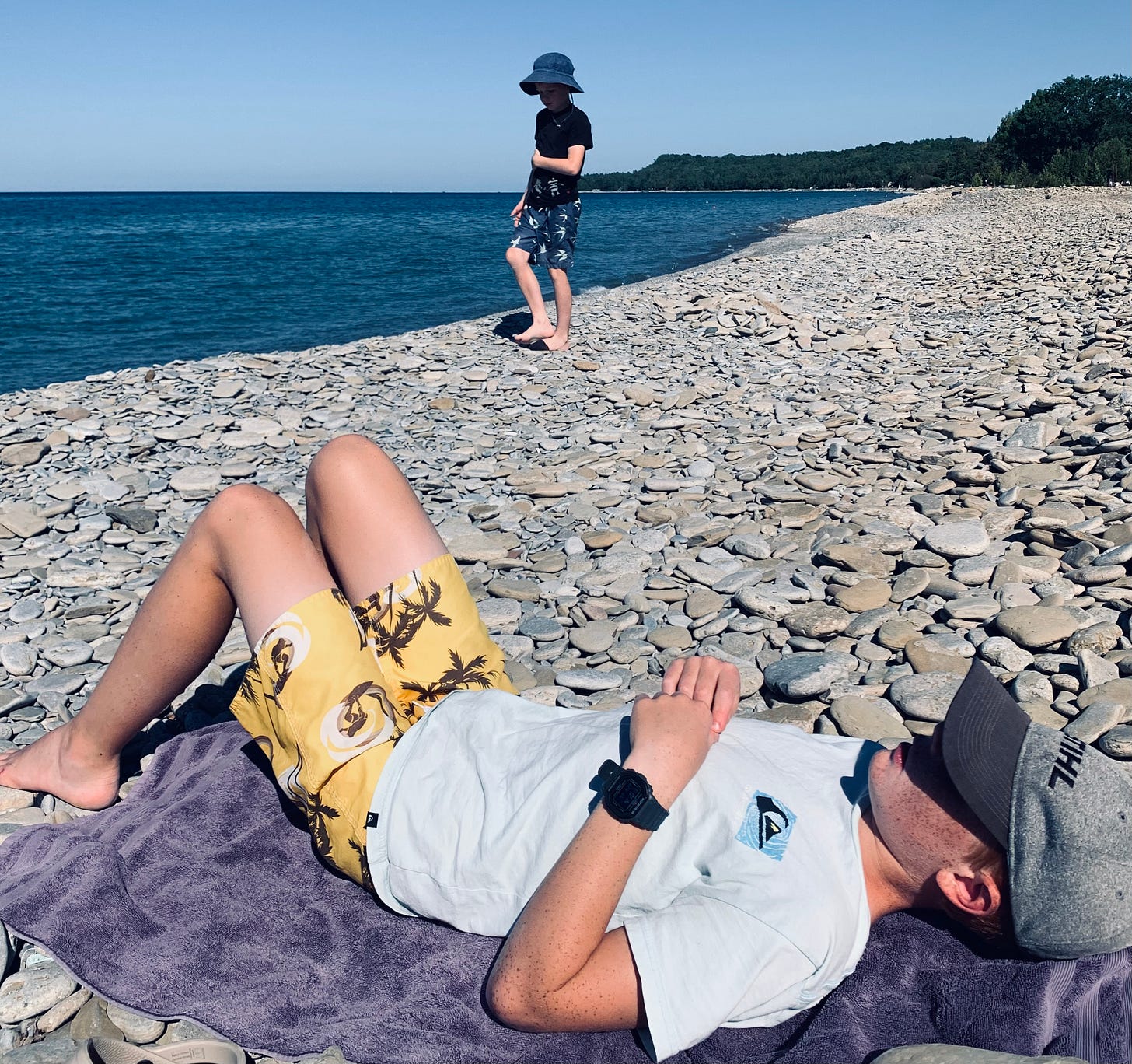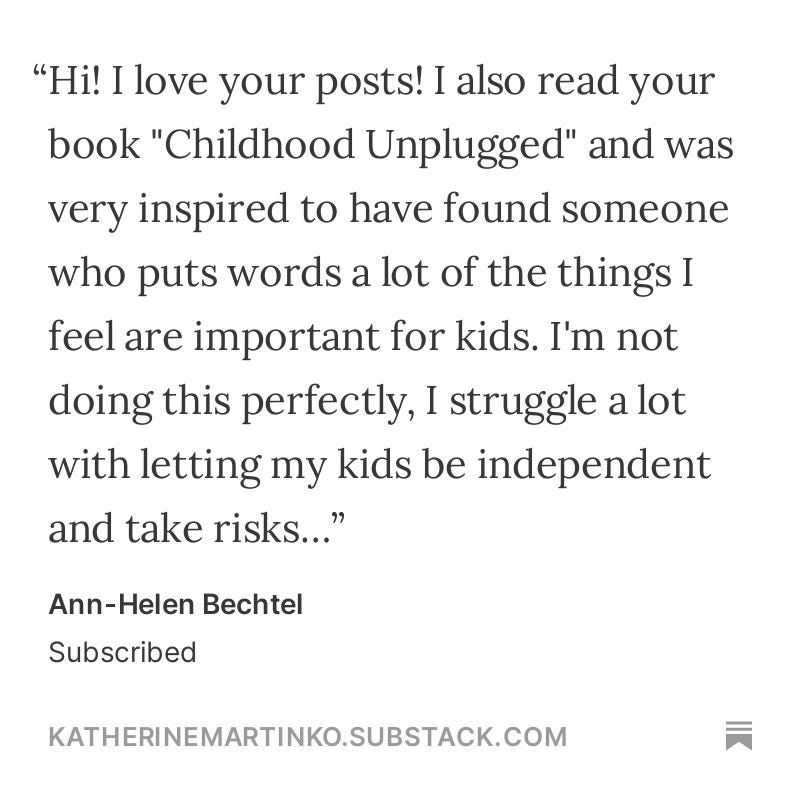Last month, I wrote a post called “A Day in the Life of a Screen-Free Kid.” It offered a glimpse into a typical school day, which I think is the hardest time to keep kids off devices. But one reader wanted to hear what my kids do during summer break, so I promised an update once the holidays had begun.
The first thing I’ll say is that I don’t believe the idyllic free-range years of the ‘50s, ‘60s, and ‘70s exist only in the past. As humans we tend to romanticize the past, to assume that things are radically different now. Yes, they are different, but I bet parents during those decades did not feel like they were living in some golden age of childhood; they probably felt a lot like we parents do today, worried about cars and creeps and bad influences.
I firmly believe that we need to reframe our thinking around this and view the childhood that our children are experiencing now as their golden age. After all, it’s the only shot they get, so we might as well do whatever we can to make it wonderful for them. The best way to do that is to step back and allow them to explore in ways that we did as kids. If you do that, and particularly if other parents around you do the same, you’ll be allowing them the chance to look back and feel someday that the 2020s were actually the greatest time to be a kid.
The second thing I’ll say is that screen-free summers look different for every family. My own family’s life is shaped by the fact that we live in a smallish rural town in Ontario, Canada on the edge of Lake Huron (this has its upsides and downsides), and by the fact that I work from home. Throughout the summer, there is always a parent on the premises, though I spend most daytime hours hidden away in my backyard office.
Sometimes I wonder how different it would be if I still lived in a big city, but then I think about how consciously I’ve invested in building community and relationships over the 14 years I’ve lived in this town, after moving here from Toronto—and I suspect I would’ve done the same in the city. Once you have a network of trusted families and homes, I don’t think it matters where you live, and I do believe that people are fundamentally the same everywhere.
So, what do my kids do all day?
6:30-8:30am: Lazy wakeups
They all wake up at different times. They are responsible for getting their own breakfasts, since I start work at 5:30. They make eggs and toast. Sometimes they embark on more ambitious projects like waffles or pancakes. They’re in charge of kitchen cleanup.
The first part of the morning has a slower pace. They feed and play with their hamster. They lounge around, flipping through books or the educational magazines they get, Muse and Ask. I write any required chores on the blackboard in the kitchen, reminding them of what needs to be done that day, like folding laundry, taking out recycling, weeding, or mowing the lawn. They’re sluggish and seemingly content with just existing without stimulation, so I mostly let them be.
9-11 am: They slowly get more active.
They meander outside and feed the little chipmunk they’ve trained to eat out of their hand. They check out the robin’s nest under the treehouse to see if the eggs have hatched. They play board games, like crokinole and chess. They do art. Sometimes they bake cookies. They chip away at the chores I’ve outlined.
11 am-1 pm: Friends start to trickle in.
I hear the squeak of bicycle brakes and I know someone has arrived. As soon as there’s new blood in the house, the atmosphere shifts. Everyone becomes more animated, voices louder, games livelier. The hamster and chipmunk are presented. Snacks are distributed. I can hear music turned on (via an old phone in a kitchen drawer).
Everyone helps themselves to lunch. Again, they’re on their own. I reheat leftovers for myself, whenever there’s a break in my day. But they make themselves BLTs or cheese quesadillas or pasta with jarred pesto sauce. I’ll cut up a watermelon and set it out for public consumption; it’s gone within minutes.
1-3:30 pm: More squeaking bike brakes. More friends.
Our home is a social hub. The teenagers start to roll in to see my oldest son. I can hear them practicing backflips on the trampoline and testing out the slack line (no one is very good at it yet). They play basketball for hours in the driveway. Then I hear the clang of iron and know that the big boys are working out in the garage. They crank the tunes, and I let them be.
There is usually an exodus that occurs at some point. The 12- and 14-year-olds end up leaving on their bikes to move to a different friend’s house or do a longer trail ride through the nearby provincial park or visit the beach. They all make pilgrimages to the corner store to buy candy or ice cream cones, and the 9-year-old frequents the dollar store regularly with his friends to buy cap guns and water balloons that they fill with the hose. I don’t love these purchases, for obvious reasons, but I do love the essence of them—the delight they derive from spending their own money so frivolously.
This week, the youngest is attending an afternoon art camp in town, and I’ve assigned an older child to escort him and his little friend on their bikes for daily drop-off and pick-up. I biked with them the first day to establish a safe route, but now they’re on their own. The older ones are paid to mow lawns and walk the neighbour’s dog, so they often do this in the afternoons, too.
3:30-5 pm: Beach time
If I finish work on time and don’t go to the gym myself, I take them all (random friends included) to the beach, which is just at the end of our street. I set up a blanket and swim with the youngest, while the two older ones head to the break wall—the cool place for teenagers to hang out. Sometimes I walk out to watch them, and that’s when they’re allowed to jump off into the rough deep water on the other side, but not if I’m absent. I’m still a bit nervous when it comes to free-range parenting around water, though they’re allowed to swim independently on the calmer bay side of the break wall.
6-8pm: Dinner and sports
I bike home to make dinner (which my husband may have started already), telling the kids when they need to be back. We eat early, then the soccer scramble begins. There’s a practice or game every weeknight, and sometimes games require us to travel up to an hour from home. I’m not a fan, but they love it so much that I’m happy to do it. We carpool a fair bit, so I don’t go to every game.
Early Bedtime
Boys come home from soccer, eat more, talk about their day. Occasionally, the oldest will stay up and watch an episode of Seinfeld with his dad. More often he’ll chip away at whatever book I’ve assigned him to read. (I’m trying to expand his literary knowledge, and the current one is Man’s Search for Meaning by Viktor Frankl. He finds it less amazing than I did.)
Weekends: Very different from weekdays
We clean the house all together on Saturday mornings, make a menu plan and shop for groceries in the afternoon, then spend many more hours at the beach, often with a large group of friends. There are frequent barbecues or shared dinner parties at night, followed by backyard campfires or sunset walks that go late.
Frequently, we make the 3.5-hour trek up north to Muskoka, Ontario’s famed cottage country, which is where I’m from and my whole family still lives. Then we spend the weekend swimming off the dock, sometimes doing a canoe trip, and eating far too much pizza from my family’s wood-fired pizzeria. My oldest will move up there for 2 weeks in August to work. Here I am, hard at work with my brother Graham:
The Best Time of Year
The feeling of summer evolves every year, due to the kids’ ages. I’m very much a lifeguard parent, inhabiting the sidelines for emergencies only. They go through stages, too. They used to be obsessed with the skate park and went there daily to practice scootering, but not so much anymore. They went through an aggressive skimboarding phase, but that too has passed. This summer seems to be all about biking and working out.
I notice that the requests for screen time subside during the summer months. I think it’s because they’re out of the school environment and removed from the social pressure to conform. There’s less comparison going on. They’re not made to feel bad for being different because they’re only hanging out with their close friends (most of whom have phones and no doubt “share” them when they’re hanging out). Each does a full week of sleepaway summer camp that surrounds them with other screen-free kids.
Curbing kids’ screen usage is a good idea at any time of year, but I do think summer is the best time for a digital reset. There’s so much else going on, the weather is great, kids can play outside, and there are other children around. Use it to your advantage!
You Might Also Like:
What Is the Purpose of Childhood?
Designing for Offline Play
Let Them Have Silence
A Note to Subscribers:
A big heartfelt thank you to anyone who has opted to upgrade their subscription to paid. I continue to keep all content open and accessible to readers, but my dream is for this newsletter to become self-sufficient. The only way that’s possible is through reader subscriptions. And it makes my day hearing from people who find my work helpful:






Always wonderful to come across concrete ideas for shaping days differently! We'll actually be heading up to Point Farms beach today to enjoy some sunshine, pebbles, and a refreshing swim :)
Thank you for sharing this. I have to say, this sounds pretty idyllic to me. As someone who lives in a city that isn't very bikable or walkable, I found your statement about consciously cultivating community very encouraging. My son is only 1 so I can only speak in theory, but it seems that community is a big component (and perhaps benefit) of a screen-free childhood. I'd love to know more about how went about this before your children were old enough to build their own friendships.